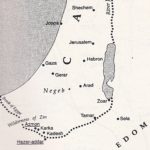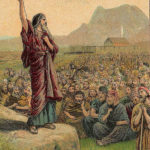There are 3 passages in the Torah that are regularly cited which detail the origins of Israel’s judiciary, that is the establishment of judges to judge the people: Exodus 18:13-27, Numbers 11:14-16, and Deuteronomy 1:9-18. Each one of these traditions exhibit minor variations when compared with one another. Compare also contradiction #153. The most noticeable of these variations, indeed contradictions, is to be found in the Deuteronomist’s rewriting of the earlierRead More
Category: Exodus
#228. Whose idea is it to form the judiciary: Yahweh’s OR Jethro’s? (Num 11:14-16 vs Ex 18:13-27)
#230. Were there still 600,000 men OR not? (Num 11:21 vs Ex 23:28; Num 11:1)
This contradiction builds on two previous contradictions: #116: How many Israelites left Egypt during the Exodus: 600,000 OR 625,550? and #218: The total number of Levites is 22,300 OR 22,000? Excluding the contradiction between P’s 625,550 men and E’s 600,000 men, the particular discrepancy here is that between the Elohist source’s first mention of the 600,000 men who left Egypt in Exodus 12:37 and its reiteration of the same 600,000 men in NumbersRead More
#232. Is Aaron rival to and envious of Moses OR not? (Num 12:1-2 vs Ex 40:12-16; Lev 8:10-13, 8:30, 9:8-22, 10:8-11, 16:1-34, 21-22; Num 3:5-10, etc.)
There are two places in all of the Pentateuch where Aaron is presented in less than flattering terms, as doing something gravely wrong: as the fabricator of Israel’s greatest sin during the wilderness period, the Golden Calf (see #157, #160-161), and as jealous rival and want-to-be to Moses and his authority as depicted in Numbers 12:1-2. Additionally it is only in these two stories that Aaron addresses Moses as “my lord,”Read More
#245. Is the Sabbath an eternal covenant decreed by Yahweh that must be kept under penalty of death OR not? (Ex 31:12-17, 35:2; Num 15:32-36; Matt 5:18-20 vs Acts 15:29; Rom 14:5-6; Gal 3:23-25, 4:9-10; Col 2:16)
All of the Torah’s Sabbath laws, including the account of its consecration as a holy day by God himself at creation (Gen 2:3), were penned by the same author or priestly guild!—what scholars have come to label as the Priestly source. Indeed the Sabbath itself has a much earlier origin than the writings of this 6th century BCE elite priestly guild. Thus the Sabbath is found in the earlier Yahwist andRead More
#254. Who can burn incense in front of Yahweh: only Aaronids OR not? (Ex 30:7; Num 17:5; 1 Chr 23:13; 2 Chr 26:16-19; Lk 1:8-11 vs Deut 33:10; 1 Sam 2:28; 1 Kgs 9:25)
The message endorsed through the tale of Korah’s rebellion in Numbers 16-17—that only the Aaronid priests can offer incense to Yahweh and only at Yahweh’s altar—is yet but another story in a long list meant to legitimate the Aaronid’s sole right to minister to Yahweh. We have now seen in this Aaronid written text, the Priestly source, “Yahweh” endorse: the sole selection of the Aaronids as his priests, while at theRead More
#262. Where did the Waters of Meribah happen: in the wilderness of Sinai or Zin? (Ex 17:2-7 vs Num 20:2-13)
#263. Do the people quarrel with Moses OR Moses and Aaron? (Ex 17:2 vs Num 20:2)
#264. Is Moses commanded to strike the rock or speak to it? (Ex 17:6 vs Num 20:8)
#265. Was Yahweh’s holiness affirmed OR not (Num 20:13 vs Num 20:12)
The present contradictions concerning the story of the Waters of Meribah should be seen in the broader context of other duplicate stories from the wilderness tradition (e.g., #125, #127, #128, #171, etc.), which were redacted together centuries after these once independent versions circulated as oral and/or written stories in differing cultural settings and time periods, and for different purposes. What many modern “readers” fail to acknowledge is that storytelling was partRead More
#294. To which god was Balaam subservient: Yahweh OR El? (Num 23:8, 23:26 vs Num 23:8)
#295. By which god was Israel blessed: Yahweh OR El? (Num 24:1 vs Num 24:4)
#296. Who liberated the Israelites from Egypt: Yahweh OR El? (Ex 20:21; Lev 19:36, 23:43; Deut 5:6, 13:10, etc. vs Num 23:22, 24:8)
In contradiction #27—Is Yahweh and El the same god or different gods? (which has become one of my most visited posts)—I not only laid out the biblical evidence suggesting that Yahweh and El were variously viewed as the same deity on several occasions, while in a few rare instances as two distinct deities, but I also summarized the scholarly evidence for the claim that (some of ?) the early Israelites actuallyRead More
#311. Was the regular burnt-offering (tamid) performed at Sinai OR not? (Num 28:6 vs Ex 24:3-7, 32:5-6; Lev 8-9)
Numbers 28-29 outlines the schedule of public sacrifices performed in the cult during the calendar year. The schedule complements P’s list of public festivals or holy assemblies enumerated in Leviticus 23 (see Festival Calendars for an overview). It is one of five different sacrificial or festival calendars in the Torah, whose contradictions and historical developments we’ve already discussed: For the Passover see #194-197 For the Festival of Weeks see #198-204 ForRead More
#312. Was the tamid to be performed once daily OR twice? (2 Kgs 16:15; Ez 46:13 vs Ex 29:38-42; Num 28:3-8; 1 Chr 16:40)
Despite Number 28’s decree that the tamid was to be offered twice daily, in the morning and in the evening, this sacrificial legislation seems to reflect public cultic practices of a late time period in Israelite history, to be exact of the post-exilic period. First, as we saw in the previous entry (#311), the tamid is only mentioned two times in all of Torah legislation, and not surprisingly in some ofRead More
#326. Did Moses write down the Israelites’ itinerary by order of Yahweh OR not? (Num 33:2 vs Ex 15:22, 17:1; Num 11:1-3, 12:15, 13:26, 21:4, 21:18; Deut 1:1-2, 2:8, 10:6-7, etc.)
And Moses wrote down their route according to their points of departure by Yahweh’s word. (Num 33:2) Although there is no verse in the Torah that explicitly contradicts the claim made here in Numbers 33:2, there is nonetheless implicit support for drawing this claim into question by pinning it against other, and variant, itinerary traditions of the Torah that were also allegedly written by word of Yahweh, and which contradict and/orRead More
#327. Do the Israelites leave Egypt on the 15th day of the 1st month OR on the 14th day? (Num 33:3 vs Ex 12:14-19)
#328. Do the Israelites leave in full view of all of Egypt OR not? (Num 33:3 vs Ex 12:31-39)
Numbers 33:3’s summary of the Exodus event varies with the account in Exodus 12 on two points. First, within the Priestly tradition itself there seems to have been a discrepancy on the date assigned to the actual Exodus. Was it the 14th, that is Passover, or the 15th, that is the following day? Indeed this discrepancy may have actually been more of a discrepancy on calculating when day begins. So whileRead More
#329. The Wilderness of Etham OR Shur (Num 33:8 vs Ex 15:22)
Numbers 33 seems to be an independent source which attempts to tally up the Wilderness itinerary from the time the Israelites leave Egypt to their arrival on the plains of Moab 40 years later (see Introduction to Numbers 33). Scholars attribute this composition to a later redactional layer from the Priestly source. Moreover, scholars contend that part of this redactional process included inserting itinerary verses into the narratives of Exodus andRead More
#330. From the Wilderness of Sin do the Israelites travel to Dophkah, Alush, and then Rephidim OR directly to Rephidim? (Num 33:12-14 vs Ex 17:1)
There are a number of place-names and even whole sections of the wilderness itinerary mentioned in Numbers 33 that are not found, or are contradicted, in the wilderness narratives of the books of Exodus and Numbers. Here is one of our first examples. In the itinerary of Exodus 16:1–17:1, the Israelites arrive in the wilderness of Sin exactly 1 month after the Exodus, “on the 15th of the 2nd month fromRead More
#342. Were the Israelites to dispossess the indigenous Canaanites OR utterly destroy them? (Num 33:51-52; Ex 23:28-33 vs Deut 7:1-16)
The itinerary of Numbers 33 ends at verse 49 with the Israelites on the plains of Moab, with no mention of a Transjordanian conquest as previously noted (#341). Here our Priestly author launches into the conquest of the promised land theme, articulated as the very words of Yahweh himself: Speak to the children of Israel and say to them: “When you cross the Jordan to the land of Canaan, you shallRead More
#343. What were the borders of the land of Canaan promised to the patriarchs by Yahweh: from the brook of Egypt to the Euphrates OR from the Red Sea to the Euphrates OR from the Wilderness to Lebo-Hamath OR from Beersheba to Dan (Gen 15:18; Deut 1:7, 11:24; Josh 1:4 vs Ex 23:31 vs Num 34:1-12; Josh 13-19; Ezek 47:13-21 vs Judg 20:1; 1 Sam 3:20; 2 Sam 3:10, 17:11, etc.)?#344. Did Yahweh promise Gilead and Transjordan as part of the promised land OR not (Deut 1-3, 34:1-3 vs Num 34:1-12; Ezek 47:13-20)?

The Bible as it has come down to us preserves a number of varying traditions concerning the size and border of the promised land. Said differently, throughout the roughly six centuries that defined the monarchy, Israel’s exile, and its post-exilic restoration, biblical scribes variously delimited Israel’s borders, often in idealized and utopian ways. This fact the biblical record bears witness to. And Yahweh spoke to Moses: “This is the land thatRead More
#349. Does the book of Deuteronomy contain “all the words” that Yahweh spoke to Moses across the Jordan OR not? (Deut 1:1-3 vs Ex 21-31, 34-40; all of Leviticus; Num 1-10, 15, 17:1-20:13, 28-31)

The book of Deuteronomy opens with this seemingly innocuous claim: These are the words which Moses spoke to all of Israel on the other side of the Jordan in the wilderness, in the plains before the Suph (sea), between Paran and Tophel and Laban and Hazeroth and Di-zahab (11 days from Horeb by way of mount Seir up to Kadesh-barnea). And it came to pass in the 40th year in theRead More
#352. Who initiates the proposal to appoint judges over the Israelites: Moses OR Jethro? (Deut 1:9-13 vs Ex 18:17-23)#353. When is this judiciary appointment made: before OR after Sinai? (Ex 18:13 vs Deut 1:19)#354. Where is the judiciary formed: at Rephidim OR Horeb? (Ex 19:2 vs Deut 1:19)#355. What are the criteria of selecting these judges: “men of truth, who fear god and hate gain” OR “men with wisdom, discernment, and knowledge”? (Ex 18:21 vs Deut 1:13)#356. Did “Moses do everything that Jethro had instructed him to do” OR not? (Ex 18:24-25 vs Deut 1:9-18)
In my previous post, Moses Retells His Story (Part 1) we saw how a reader might react to the realization that Moses’ renarration of the appointment of the judiciary in Deuteronomy 1:9-18 differed significantly from its “original” narration in Exodus 18:13-26. In that post, I neither attempted to explain why, nor how, these differences existed. I simply presented our 1st person reader grappling with these textual inconsistencies and contradictions which heRead More